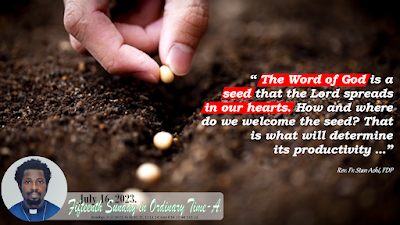THE QUALITY OF THE SOIL AND THE CARE FOR THE SEED.
July 16, 2023.
Fifteenth Sunday in Ordinary Time – A.
“The seed is the word of God, Christ is the sower. All who
come to him will have life forever.” Cf. Acclamation.
A Latin proverb says: “Every soil does not bear the same
fruit.” And a Tshi proverb adds: “When a yam doesn't grow well, we don't blame
it; it is because of the soil.”
For a good harvest, many factors are required, among them
the quality or receptivity of the soil and the care the sower put for the seed.
For a few weeks, with our seminarians, to keep ourselves
busy doing something productive, besides the normal spiritual, intellectual,
human, and charismatic formation that the Aspirancy program holds, we decided
to do some vegetable gardening. For me, that is not something so new. For,
years back, when I was in Kenya, I was doing it as well. The most impressive,
however, is how it took us time to prepare the soil and the whole gardening
ground. We needed first to fence the area to prevent our cows from entering
there. Then we cleaned the grasses, made beddings, and put the seeds in
nurseries trails for that which required it. Other seeds, we put straight into
the soil.
By coincidence, it was the hottest summer, so watering daily
was a must. A lot of effort, just for the seeds to get the propitious and sound
ground to facilitate their growth and productivity. All this was out of care
for the seeds. Because, we knew that what matters is the ground, the soil, and
not so much about the seeds. Some exceptional cases raised that some of our
seeds did not germinate. Without discouragement, nor sorrow, we replaced them
with new seeds, assuring that everything was in good condition.
We learned from this experience that farming requires the
dedication of the farmer, the receptivity of the soil, and good environmental
conditions. It is only when all these conditions are met that one can dream of
a possible abundant harvest.
Coming to our today's liturgy, we are put into the
agricultural context. The Lord is portrayed in the body of a farmer. His word
is presented as the seed he sows. And our hearts as the soils that receive the
seed. The care of the seed is assured because of who the farmer is. The quality
of the seed is also without question because it is God's word. The question or
the main issue here is the ground, that is our hearts. It is about how do we
receive the seed God sows in our hearts.
Let's go then farming and harvesting in God's word of today.
In the first reading, the word of God is compared to the rain that, once it
falls from heaven, does not evaporate or return to its author until it has
fulfilled its purpose, "watered the earth, making it fertile and fruitful,
giving seed to him who sows and bread to him who eats..."
Comparison is not necessarily reason; they say. The word of
God is more powerful than rain. It penetrates the heart of those who listen to
it and transforms it. What is needed is joyous receptivity. God's word does not
oblige. It is given. It is all up to us to accept or reject it. It will only
bear fruit through how we accept it. Which kind of soil are we?
In the Gospel, the Lord Jesus goes further to use the image
of the seed to describe God's word. The word of God is a seed that the Lord
spreads in our hearts. How and where do we welcome the seed? That is what will
determine its productivity.
The Lord, giving the parable of today's Gospel makes it
clear. “A sower went out to sow." The seeds, the grains which are sowed
are unique and identical. The problem is, where do they fall? Is it out of the
carelessness or the great generosity of the sower, but some grains fall on the
roadside soil? Some fall on the shallow rocky soil. Some others on the
thorn-infected soil. Finally, some grains fall on the fertile soil. Each of
these soils will impact the seed and determine its future. On the roadside, the
seed is soon devoured by the birds. On the rocky ground, the seed springs, but
because of the shallowness of the soil, it does not resist heat and other
weather conditions. In the thorns, the seed is quickly choked by the thorn and
did not germinate. Only the fertile soil brings hope, the grain, we read,
germinates, grows, and produces plentiful fruits.
The most beautiful thing about this parable, that makes it clearer for us is that Jesus explains it to his close friends. So, the point is no longer on our comprehension of what the Lord means in this allegory of the Kingdom of God, but how do we apply it to ourselves? Which kind of soil are we? How do we welcome God's word sown in our hearts?
Oftentimes, regrettably, though we read and read, hear and
hear, listen and listen, and even meditate unstoppably on God's Word, it seems
not to impact or affect our lives. We are always overwhelmed by the lure of
wealth and preoccupied with worldliness that all these snuff in us the fire of
the word of God. We, sometimes, make it hard to accept and abide by the truth
and the Good News of Christ. The words of Paul, in the second reading, could
sound like a warning to us. With the whole creation, we are expecting the
revelation of the children of God. Let's live then in this hope and do all we
can to abide by the word sown in our hearts. Only then we will be fruitful.





Comments
Post a Comment